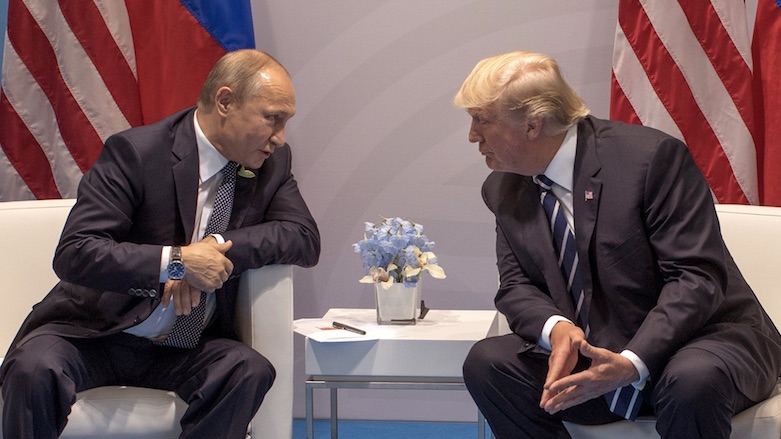US sanctions strain ties with Russia, threaten cooperation on key issues

LONDON, United Kingdom (Kurdistan 24) – US President Donald Trump lamented the Congress sanctions bill targeting Russia that he grudgingly signed into law in the face of a Congress veto, as he decried, “our relationship with Russia is at an all-time and very dangerous low.”
The Countering America’s Adversaries Through Sanctions Act, which places Russia in the same bracket of threat as Iran and North Korea, complicates US foreign policy, potential settlement of the Syrian war, and general US-Russian cooperation on global issues.
Trump’s campaign pledge was to foster better ties with Russia, but ironically, with ongoing investigations into alleged Russian meddling of the US election, Russia has become a dark cloud over the White House and internal US politics.
It has placed Trump in a difficult standoff with Congress, who he criticized of overstepping its constitutional authority, but also created doubt on his power to dictate foreign policy without obstruction.
Recent events have also highlighted inconsistencies of the Trump administration over Russia.
For example, Vice President Mike Pence was much less reconciliatory toward Moscow on a tour of the Baltic, stating, “no threat looms larger in the Baltic states than the specter of aggression from your unpredictable neighbor to the east.”
The sanctions also potentially put the US at loggerheads with the EU, as Europe faces great impact by any energy sanctions on Moscow due to its energy reliance on Russia.
So far, Moscow has largely given Trump the benefit of the doubt relating to ties, even as the prospects of improvement has rapidly disappeared.
However, the sanctions bill, giving Congress a strong hand in the future of the matter, threatens a long-term noose around relations. It drew a naturally strong reaction from Moscow.
Labeling the latest sanction as a “full-scale trade war” against Moscow, Russian Prime Minister Dmitry Medvedev claimed the package “ends hopes for improving our relations with the new US administration,” while slating Trump’s perceived impotence against Congress.
The sanctions may result in economic pressures on Russia, but headstrong Russian President Vladimir Putin is even less likely to back down on Russia’s geopolitical ambitions that have seen it display a strong hand over Crimea, Ukraine, and Syria.
With US influence in the Middle East on the decline, Russia has become a key player in the resolution of many regional flashpoints.
In the case of Syria, Russian-US cooperation is vital not only to achieve an elusive political settlement to end the devastating six-year civil war but to avoid any situation that inadvertently pits their forces into a dangerous collision course.
With the soft partitioning of Syria taking hold, the US has carved out a key sphere of influence in partnership with Kurdish forces.
Meanwhile, Russia has shown a long-term commitment to Syria as their critical gateway to the Mediterranean with the signing of a half-century deal with Damascus over the Hmeimim air base, adding to the long-term deal over their naval base in Tartous.
In fact, Tartous was one of the locations chosen for the recent Russian military parade, highlighting its prized status and Russian assertiveness.
US Secretary of State Rex Tillerson recently laid out Washington’s strategy in Syria, while underlining the importance of focusing on mutual interests with Russia such as the fight against terrorism.
Tillerson, who condemned the sanctions as unhelpful on efforts for diplomacy with Russia, pointed to the ongoing battle with the Islamic State (IS) in Syria and the civil conflict in the country.
“What we are hoping to avoid is the outbreak of a civil war,” he said.
“What we really have is two conflicts in Syria: the war against [IS] and the civil war that created the conditions for [IS] to emerge,” the US official continued.
Tillerson added, “We’re working closely with Russia and other parties to see if we can agree a path forward on how to stabilize Syria, in the post [IS] world, create zones of stabilization and lines of deconfliction that will hold, and then create conditions for the political process to play out in Geneva.”
There have been some positive signs between the US and Russia on Syria such as a ceasefire deal between Putin and Trump on the sidelines of the G20 summit, and the US decision to cut assistance to rebel groups fighting Syrian President Bashar al-Assad’s regime, a move that many analysts saw as appeasing Moscow.
While Tillerson maintained calls for Assad’s removal from power and that Iran “must leave and go home,” Russian and Iranian domination of Syria is too entrenched, leaving Washington with a limited hand in Syria save the Kurdish area of influence and the fight against IS.
Even the fight for the remaining lands under IS will likely see a de-facto partition agreement between Russia, the US, and their respective allies.
Russia may be keen for cooperation to continue, but it is now even less likely to be dissuaded from its policies, especially when these key matters affect its growing strategic ambitions.
Editing by Karzan Sulaivany
